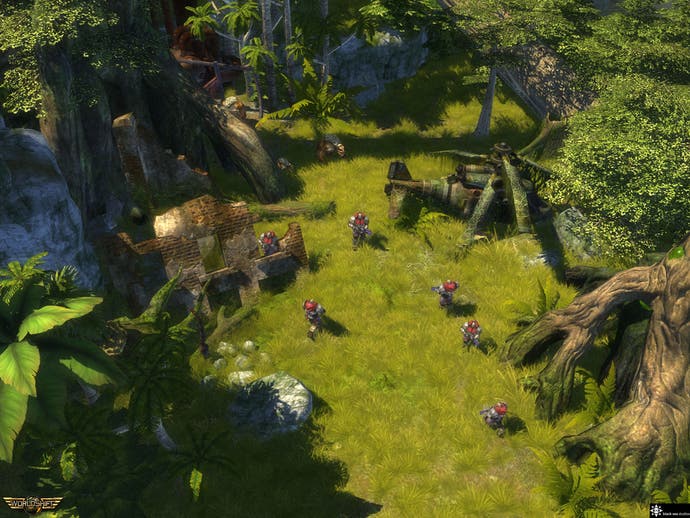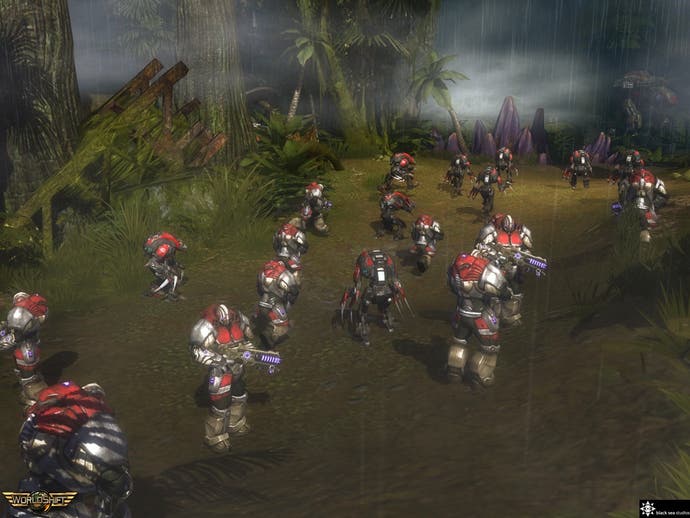WorldShift
Real-time strategy rethought.
If someone asked you to name a real-time strategy game on PC, you could probably reel off a list as long as your arm. It's a well established and hotly contested genre, and you're tall. And memory-some. But some observers accuse it of growing rather stale, relying too heavily on the same tried and tested mechanics time and again. Which is why Bulgarian developer Black Sea Studios came up with a fast-paced and action-orientated RTS when it sat down to think about its next big project.
Unlike its first, celebrated outing Knights of Honor, WorldShift won't clog your fragile brain with expansive tech-trees and unit upgrades; it simply wants to drag you straight into the action. You'll control tens rather than thousands, and customisation will come in the form of relics and items placed in limited Ability Grid slots to boost your effectiveness - swapping and changing to freshen your tactics or replace old pieces.
Mix all that into a sci-fi setting with an almost exclusive multiplayer focus revolving around community features and co-operative gameplay, and Black Sea certainly promises something interesting. So, with our interested suitably piqued, we journeyed into the heart of differentiation to talk to lead designer Vesselin Handjiev about the game.
Um, let me see: Lesson 1: Games are about fun! Lesson 2: Games must be easy to understand and enjoy!

Well, this and the co-operative multiplayer features are the essence of WorldShift. Lots of details will be covered on the game's website in time, as it's an area that needs a lot of explaining. So, thank you for asking! First off, when we began outlining the concept of WorldShift two years ago, we asked ourselves what was happening with the RTS genre. Games seemed to get prettier, World War II became World War III, and most became so complex and full of conditional rules that it now takes a serious effort to learn them before you can start having fun.
Even I haven't played some of the major releases because I didn't want to learn another tech-tree or bonus scheme. It feels as though - with a few exceptions - we've been playing the same game re-incarnated numerous times over the last decade! So, we decided to risk it and attempt to explore a different approach. In WorldShift you play with a small number of units, typically in the range of 30 to 50. There are very few buildings to construct and no tech-trees or upgrades whatsoever. Almost all your units are accessible from the very beginning, too, as there's no real early or late-game stages. As a result, the encounters are very hectic and full of adrenaline, with lots of room for player skill.
As you play the game you'll find items and relics somehow preserved during the aeons of plague, which are part of the mysterious past of our planet - don't worry, you'll find out much more as you progress through the story. Once you collect these they're stored in your persistent inventory. Each faction has a separate inventory. Between battles you can take a look at your inventory and decide which items you want to put in your Ability Grids. Each faction has its own unique version, which provides a number of slots for items (15 or so arranged into groups like Armour, Weapons, Shields, Implants, etc.) that represents what we call the faction build. There is no need to change your faction build before every single game they play, but you might want to rethink it if you find some way to improve it, or if your find better items to replace older ones. Items and relics have different quality levels, too, as well as properties, bonuses, and rarity - and there's a huge amount of them to collect. Some can be acquired really easily, but others are tough cookies. For the powerful relics you'll need to team up with your friends to complete special co-operative missions, some of which are designed to be a real challenge, but also a real source of pride if finished successfully.
There's zillions of possible combinations for faction builds, and no such thing as the best one. It's all up to the you and your preferred style of playing; there's an ocean of tactics waiting to be explored. Would you prefer your troops to have +20 hit points or a 10 per cent chance to do double damage with grenades? The interface is pretty simple, too, so everything can be done with just a few clicks. Absolutely anyone should be able to get the idea within a matter of minutes.

It's not yet set in stone, but there are approximately a dozen different units for each faction. You control them in a normal real-time strategy way, selecting units and giving orders. For each faction we have one very special leader unit and up to four slots for officers. Each faction has four officer types available, too, allowing for lots of possibly combinations. We plan to add more information about each faction and their units on the game's website.

